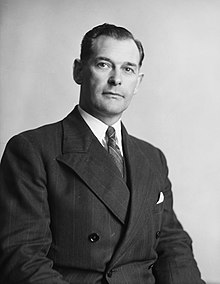Keith Holyoake
Sir Keith Jacka Holyoake KG , GCMG , CH , QSO , KStJ (born February 11, 1904 near Pahiatua , New Zealand; † December 8, 1983 in Wellington ) was a New Zealand politician and as such was twice Prime Minister of New Zealand and later Governor General of New Zealand . At just under 12, he had a very long tenure as prime minister and was known for his diplomatic style. He was also known by his childhood nickname as Kiwi Keith .
Early life
Holyoake was born in 1904 near Pahiatua in the Wairarapa region. His family lived for a time in Hastings and Tauranga , in 1913 they moved to Riwaka near Motueka .
At the age of 12 he left school after his father 's death and worked on the family' s hop and tobacco farm in Riwaka. His mother Esther trained as a teacher and continued to teach him at home. Holyoake was a Presbyterian . After taking over the farm's business, he came into contact with various local agricultural organizations, which fueled his political interest.
Early political career
The Reform Party , which had many supporters in the country, elected Holyoake as a candidate from the Motueka constituency for the parliamentary elections in 1931. The previous MP George Black kept this seat, but died the following year. Holyoake was a successful candidate for the Reform Party in the by-election. He became the youngest member of parliament to date.
In the 1935 elections, Holyoake was able to keep his seat for the coalition of Reform Party and United Party despite significant losses. In the aftermath of the election, he played a key role in transforming the coalition into today's National Party . He quickly won the respect of his colleagues and was considered a rising star in the new party. In the 1938 elections, however, Holyoake lost his seat in parliament to Labor candidate Gerry Skinner .
In 1943 he returned to Parliament as a candidate for the National Party, this time for the Pahiatua constituency. In 1946 he became deputy party chairman. After National won the 1949 elections, the new Prime Minister Sidney Holland appointed him Minister of Agriculture. Holland later formally appointed him Deputy Prime Minister as the first minister ever.
prime minister
First term
Holyoake became prime minister two months before the 1957 elections when Sidney Holland resigned on health grounds. The Labor Party won the election with a majority of just one seat, and Holyoake was the opposition leader for the three years leading up to the next election.
Second term
National returned to power in the 1960 elections. The victory was attributed to Holyoake's skilful election campaign, particularly to his attacks on Finance Minister Arnold Nordmeyer's so-called "Black Budget", which raised taxes on gasoline, cigarettes and alcohol. Holyoake's government renewed the criminal code with the Crimes Act 1961 . This abolished the death penalty . His government also relaxed union membership rules, but the majority of industrial jobs remained in the branch union system. In 1972 he resigned as premier to facilitate the succession of his deputy and friend Jack Marshall .
After the resignation
When National lost the next election under Marshall, Holyoake remained a prominent opposition politician. He played an active role in the 1975 elections. This brought the National Party under Robert Muldoon back to power. Muldoon appointed Holyoake a specially created sinecure as Minister of State.
Governor General
In 1977, Holyoake was unexpectedly and controversially appointed Governor General of New Zealand by Elizabeth II on the advice of Muldoon . The controversy arose because Holyoake was the incumbent minister and former prime minister. Many opponents of Muldoon's government called this a politically motivated appointment. Opposition leader Bill Rowling indicated that Labor could remove Holyoake as governor-general if the party won the 1978 election. He openly stated that he would rather have Edmund Hillary as Governor General. This proposal was again criticized by the government because Hillary had supported the Labor Party in the 1975 election campaign "Citizens for Rowling".
As a result of the appointment, Holyoake resigned from parliament. His administration was recognized by most as fair and balanced. His tenure as governor general lasted only three years and ended in 1980 because of his old age.
Holyoake had been married to Norma Janet Ingram since 1934 and had 5 children. He died in Wellington on December 8, 1983, at the age of 79. His daughter Diane married MP Ken Comber .
Awards
- Member of the Privy Council
- Freeman of the City of London
- Doctor of Laws H. c. , Victoria University of Wellington ,
- Doctor of Laws (Agriculture) hc, Seoul National University
The Holyoake Range , a mountain range in Antarctica, is named in his honor.
literature
- Holyoake, Right Hon. Keith Jacka, CH In: Alexander Hare McLintock (Ed.): An Encyclopaedia of New Zealand . Wellington 1966 ( online [accessed December 15, 2015]).
- Barry Gustafson: Kiwi Keith. A biography of Keith Holyoake . Auckland University Press, Auckland 2007, ISBN 978-1-86940-400-0 (English).
Web links
- Holyoake, Keith Jacka - Dictionary of New Zealand Biography - accessed August 19, 2012
Individual evidence
- ↑ John Henderson: Rowling. The man and the myth. Australia and New Zealand Book Co. et al., Auckland et al. 1981, ISBN 0-908620-03-9 .
- ^ Ross Doughty: The Holyoake years. R. Doughty, Fielding 1977, chap. 7 “Elder Statesman”.
| personal data | |
|---|---|
| SURNAME | Holyoake, Keith |
| ALTERNATIVE NAMES | Holyoake, Keith Jacka (full name); Kiwi Keith (nickname) |
| BRIEF DESCRIPTION | New Zealand politician, Prime Minister of New Zealand |
| DATE OF BIRTH | February 11, 1904 |
| PLACE OF BIRTH | Pahiatua |
| DATE OF DEATH | December 8, 1983 |
| Place of death | Wellington |



